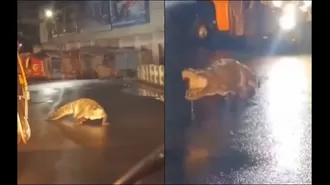2 deaths linked to risky neck-twisting massage prompts warning.
Experts cautioned that it could result in paralysis.
December 28th 2024.

The sudden and tragic deaths of two individuals in Thailand have raised concerns about a popular massage technique known as "neck-twisting." One of the victims was Chayada Prao-hom, a 20-year-old Thai singer also known as Ping Chayada. She had sought out the massages in an attempt to relieve shoulder pain, but sadly, the sessions only seemed to worsen her condition. After just three sessions, she experienced paralysis and eventually passed away from sepsis, a swollen spinal cord, and a fungal infection.
Chayada's case was not an isolated incident. Just a day earlier, a 52-year-old Singaporean tourist named Lee Mun Tuk also died after receiving a 45-minute neck-twisting massage in Phuket, Thailand. This has sparked concerns and led to an investigation into the safety of this popular technique.
In the days leading up to her death, Chayada had taken to social media to express her concerns about the massages at the licensed parlor she had visited. She specifically blamed her deteriorating health on these massages and their aggressive techniques. However, both the masseuse, known as Ms. Aoy, and health officials have denied any responsibility for Chayada's death.
Despite the warnings and investigations, the popularity of this massage technique continues to grow, with millions of tourists visiting Phuket each year. This has raised concerns about the proper training and regulation of massage therapists in Thailand. Dr. Pandu Riono, a doctor at a public health faculty, warns that neck-twisting massages can cause nerve and blood vessel damage, leading to paralysis.
Chayada's case is not the first time these concerns have been raised. In fact, a Thai neurologist, Thiravat Hemachudha, has warned about the dangers of neck-twisting massages, citing at least 55 cases of paralysis in the United States caused by this technique. This week, a massage therapist from Indonesia, Harnelis, also spoke out about the dangers of cracking and twisting bones and joints during massages. She shared a story about an elderly patient who had become paralyzed after receiving daily massages from a family member.
As a massage therapist, Harnelis knows the importance of being gentle and mindful when working with the vulnerable areas of the body, such as the neck and back. She advises against cracking and twisting techniques, as they can cause bones and joints to become misaligned, leading to serious injuries. Instead, she recommends gentle stretching for those with neck or back problems.
In conclusion, the deaths of Chayada and Lee Mun Tuk have shed light on the potential dangers of neck-twisting massages. It is important for massage therapists to be properly trained and for tourists to be cautious when seeking out these popular treatments. After all, as Harnelis reminds us, the neck and back are delicate areas that require careful and gentle treatment.
Chayada's case was not an isolated incident. Just a day earlier, a 52-year-old Singaporean tourist named Lee Mun Tuk also died after receiving a 45-minute neck-twisting massage in Phuket, Thailand. This has sparked concerns and led to an investigation into the safety of this popular technique.
In the days leading up to her death, Chayada had taken to social media to express her concerns about the massages at the licensed parlor she had visited. She specifically blamed her deteriorating health on these massages and their aggressive techniques. However, both the masseuse, known as Ms. Aoy, and health officials have denied any responsibility for Chayada's death.
Despite the warnings and investigations, the popularity of this massage technique continues to grow, with millions of tourists visiting Phuket each year. This has raised concerns about the proper training and regulation of massage therapists in Thailand. Dr. Pandu Riono, a doctor at a public health faculty, warns that neck-twisting massages can cause nerve and blood vessel damage, leading to paralysis.
Chayada's case is not the first time these concerns have been raised. In fact, a Thai neurologist, Thiravat Hemachudha, has warned about the dangers of neck-twisting massages, citing at least 55 cases of paralysis in the United States caused by this technique. This week, a massage therapist from Indonesia, Harnelis, also spoke out about the dangers of cracking and twisting bones and joints during massages. She shared a story about an elderly patient who had become paralyzed after receiving daily massages from a family member.
As a massage therapist, Harnelis knows the importance of being gentle and mindful when working with the vulnerable areas of the body, such as the neck and back. She advises against cracking and twisting techniques, as they can cause bones and joints to become misaligned, leading to serious injuries. Instead, she recommends gentle stretching for those with neck or back problems.
In conclusion, the deaths of Chayada and Lee Mun Tuk have shed light on the potential dangers of neck-twisting massages. It is important for massage therapists to be properly trained and for tourists to be cautious when seeking out these popular treatments. After all, as Harnelis reminds us, the neck and back are delicate areas that require careful and gentle treatment.
[This article has been trending online recently and has been generated with AI. Your feed is customized.]
[Generative AI is experimental.]
0
0
Submit Comment





